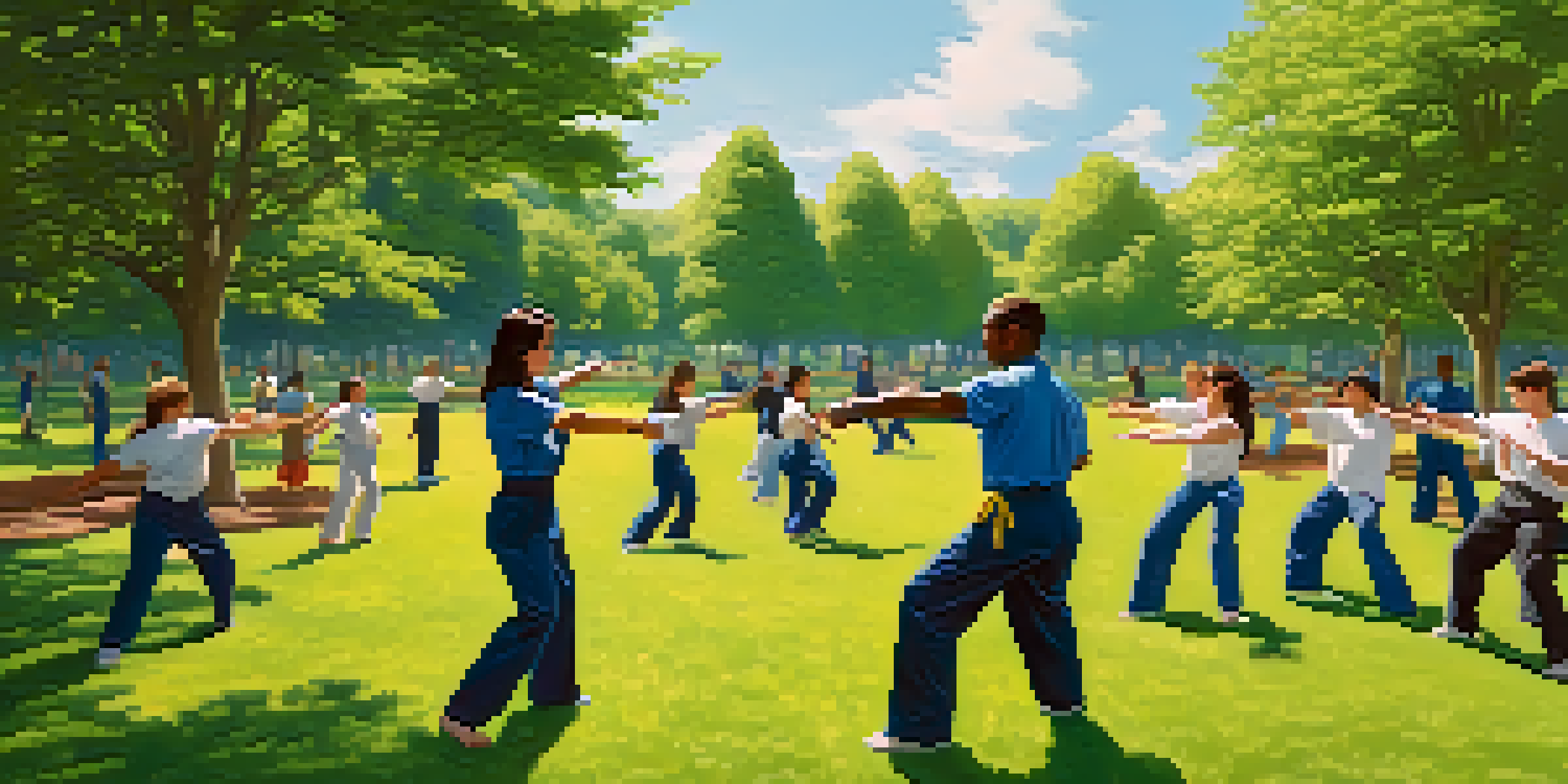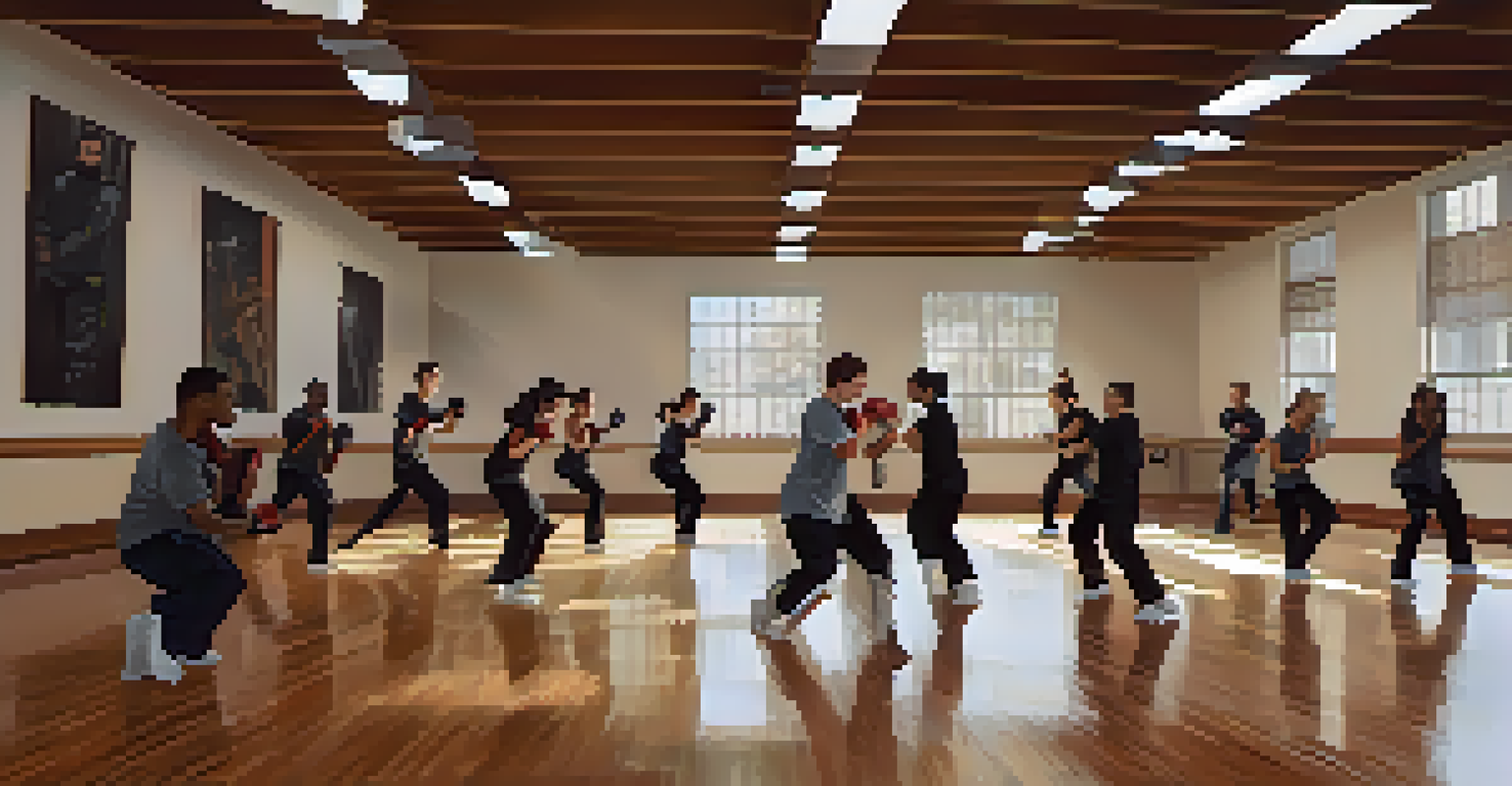Understanding the Fundamentals of Self Defense Techniques

What is Self Defense and Why It's Important
Self-defense refers to the ability to protect oneself from harm or danger. It's not just about physical techniques; it's also about mental preparedness and awareness of your surroundings. Understanding self-defense can empower you, helping you to feel more confident in everyday situations.
The best defense is a good offense.
In today's world, knowing how to defend yourself is increasingly vital. With growing concerns about personal safety, self-defense skills can be a valuable asset. Whether you find yourself in a threatening situation or simply want to build your self-confidence, these skills can serve you well.
Moreover, self-defense isn't solely about combat; it encompasses de-escalation techniques and conflict resolution. Learning how to assess a situation and respond appropriately can significantly reduce the chances of physical confrontation.
The Mindset of Self Defense: Awareness is Key
Before diving into physical techniques, it's crucial to develop the right mindset. Self-defense starts with awareness—being alert to your environment and recognizing potential threats. This proactive approach can often prevent dangerous situations from arising in the first place.

Think of your awareness as your first line of defense, akin to a lighthouse guiding ships through foggy waters. By staying conscious of your surroundings, you can identify exits, note suspicious behavior, and keep a safe distance from potential threats. This mental preparation is as important as any physical skill you might learn.
Self-Defense Empowers You
Learning self-defense boosts confidence and equips you with the skills to handle various threatening situations.
Training your mind to remain calm under pressure is also essential. In stressful situations, staying composed can help you think clearly and make better decisions. Remember, confidence and awareness can often deter an aggressor before any physical confrontation occurs.
Basic Self Defense Techniques to Know
When it comes to physical techniques, there are several basic moves every beginner should learn. Strikes, such as punches and kicks, are fundamental, as well as defensive maneuvers like blocking and parrying. These techniques can be incredibly effective when executed correctly.
Self-defense is not just about physical combat; it's about having the confidence to face any situation.
For instance, a simple palm strike to the nose or a kick to the knee can create an opportunity for escape. Think of these techniques as tools in your self-defense toolbox—each one serves a specific purpose and can be employed based on the situation you find yourself in.
Additionally, learning how to use your body weight and leverage can enhance your effectiveness in self-defense. Techniques like joint locks or throws can help you subdue an attacker without needing to be physically stronger, making them accessible for people of all sizes.
The Importance of Practice and Training
Like any skill, self-defense requires practice to become proficient. Regular training not only hones your physical techniques but also builds muscle memory, allowing you to react instinctively in high-pressure situations. Consider enrolling in a self-defense class or martial arts program for structured learning.
Training with others can also provide invaluable experience. Partner drills allow you to practice techniques safely and learn how to respond to an opponent’s movements. This collaborative environment can build confidence and enhance your understanding of various scenarios.
Awareness is Crucial
Developing mental awareness of your surroundings is the first step in preventing dangerous situations.
Moreover, consistent practice helps reinforce the mental aspects of self-defense. The more you train, the more comfortable you become in applying your skills, which can translate to improved situational awareness and a calmer demeanor in potential threats.
Self Defense for Different Situations
Understanding that self-defense is not one-size-fits-all is vital. Different situations may require unique responses, from defending against a physical attack to handling harassment. Tailoring your approach based on the context can make your self-defense efforts more effective.
For example, if confronted verbally, using assertive communication might defuse the situation without escalating it. On the other hand, if faced with a physical threat, your focus might shift to using your learned techniques to escape. Understanding these nuances can empower you to respond appropriately.
Additionally, recognizing that self-defense can also apply in digital spaces is essential. Cyberbullying and online harassment are real threats, and knowing how to protect your digital presence can be just as crucial as physical self-defense skills.
Legal Considerations in Self Defense
Before practicing self-defense, it's important to familiarize yourself with the legal aspects surrounding it. Laws regarding self-defense can vary significantly by region, and knowing your rights can help you make informed decisions in critical moments. Understanding what constitutes reasonable force is crucial.
In many places, self-defense laws allow for reasonable force in response to an imminent threat. However, excessive force can lead to legal repercussions. Being aware of these boundaries can help you navigate dangerous situations while protecting yourself legally.
Practice for Proficiency
Regular training is essential for mastering self-defense techniques and building muscle memory for instinctive reactions.
Consulting with legal experts or attending workshops can provide insights into the laws specific to your area. This knowledge not only ensures your safety but also empowers you to act confidently, knowing you are within your rights.
Building Confidence Through Self Defense
One of the most significant benefits of learning self-defense is the boost in confidence it provides. Mastering techniques and understanding how to protect yourself can transform your mindset. With practice, you’ll find yourself more assured in navigating various situations, both physical and mental.
Confidence gained from self-defense training often extends beyond physical encounters. Many practitioners report feeling a greater sense of empowerment in their daily lives. This newfound self-assuredness can improve how you interact with others and how you approach challenges.

Think of self-defense as a journey toward self-improvement. Each class, each technique mastered, and each scenario practiced contributes to a more confident you. Embracing this journey not only enhances your self-defense skills but enriches your overall life experience.
Final Thoughts on Self Defense Mastery
Mastering self-defense is a continuous journey, not a destination. The skills you learn and the confidence you build will serve you throughout your life. Whether you’re a beginner or have some experience, there’s always room for improvement and growth.
As you continue your training, remember that self-defense is as much about mental preparedness as it is about physical skills. Staying aware, practicing regularly, and understanding the legal landscape will equip you to handle various situations effectively.
Ultimately, self-defense is about empowerment. By investing time in learning these techniques and building confidence, you’re taking control of your personal safety and well-being. So, lace up those training shoes and start your journey toward self-defense mastery!